#estonian poetry
Text
Kas sa sõltud päikesest? Kas sa elatud kuust? Kas su hinge maetakse maha kirstus, mis on männipuust? Kas su matused olid ilusad? Kas peied olid truud? Nüüd kui põleb vaid päike, ega midagi muud
8 notes
·
View notes
Text


Source: Lauri Räpp sügisest
ℍ𝐚𝓵l נ𝐀 𝔳คĻǤẸ
0 notes
Text
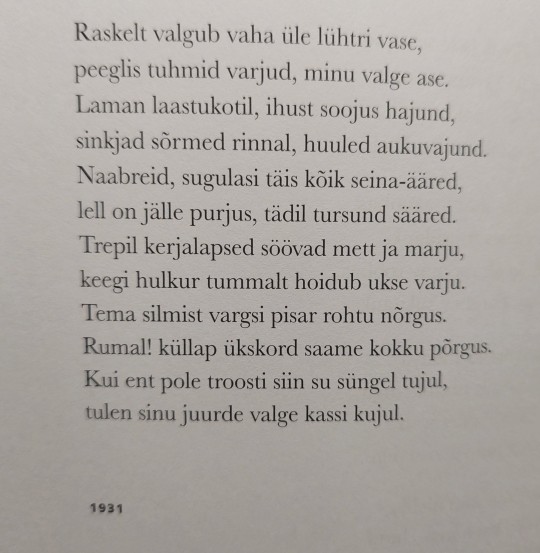
Raskelt valgub vaha, 1931
Alver, B, (2017) omajuur
1 note
·
View note
Text


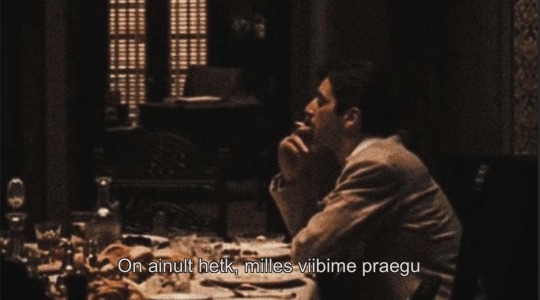

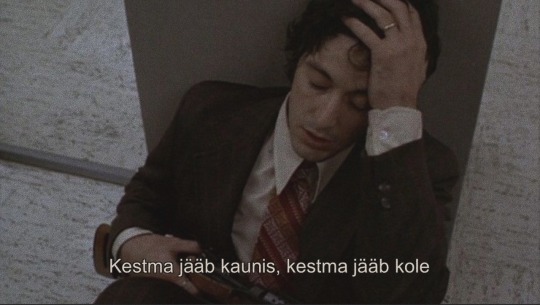
Goncharov (1973) dir. Martin Scorsese (pseudonym)
Recovered shots from the original Goncharov made by Tallinnfilm, Estonia.
Sourced from National Archives of Estonia (NAE), additional credits to this post.
#goncharov#eesti#estonia#i think its so beautiful how they used alliksaar’s poetry in this movie#fun fact! in the second picture you can actually see jaani kirik and hugo treffner gymnasium!#and the church scene was filmed inside jaani kirik#estonian cinema#eesti film#unreality
1K notes
·
View notes
Text
so we all are assuming that bojan's latest instagram captions are song lyrics and i think they're in order as well, and i can maybe kind of prove it (this is just for fun and i may just fully be wrong about this). so come journey with me to the world of poetry theory.
the captions put together with stressed syllables marked (yes i split the last caption into two because it made sense):
starlight effect and a cigarette
you should be getting ready for the big day
quotas to fill, bills to pay
the center of the world on a pedestal,
until it's your turn to take the fall
as you can see four of the five lines have five stressed syllables, making it pentameter (while the number of syllables overall is less consistent with 9-11-7-11-9, thus suggesting it is written in accentual verse as well, though that doesn't matter here).
furthermore there's rhymes! lines 2 and 3 have end rhyme just as lines 3 and 4, while the first line has a rhyme within it with 'effect' and 'cigarette', thus making this a rhyme scheme of ABBCC.
based on this i'd say that the captions most definitely are lyrics because otherwise there would be no need for them to be this structured, and they are maybe in order based on the rhymes, do with this what you will.
#my credentials: my bachelor's thesis was on poetry translation and i did a lot of poetry analysis for it#finally putting that english philology degree w a minor in estonian literature to good use#analysing potential song lyrics for a band#joker out
90 notes
·
View notes
Text
The Star-Bright Hour - Betti Alver - Estonia
Translator: Unknown (Estonian)
The wind won’t ask: to what did life amount?
To yourself you’ll render your own account.
However long, however dark the night –
your forehead bears your name in plain sight.
Each leaf that sees the sunlight falls unknown
with all the rest. Yet each one falls alone.
No shining goal, no star to travel toward?
Go and see what is consumerism’s reward.
Do you know how kindness grows, unseen and gentle?
Why cruel deeds are never accidental?
Why helmets rust unless they bloom and flower?
Why life can never repeat its star-bright hour?
Why tiny flames withstood the snowstorm’s test
and flickered on within the human breast?
Go ask your betters, do their bidding.
Go ask the dead. And then go ask the living.
But never ask yesterday
for those who happened to stray
across the sandy marsh into pitch-black night.
It’s all the same to them – was it spite
that made the boatman take his chance
without a light, or was it happenstance?
#The Star-Bright Hour#Betti Alver#Estonia#Translation: Estonian#poem#poetry#poems from around the world
5 notes
·
View notes
Text
melanhoolia
alkohoolitsen enese eest
melanhooletuses
joogid tumedad
erapooletud need
mu kaaslased
meele lahustamisel
hele-valeks naeratamisel
musti muresid
1 note
·
View note
Text
Ma olen unustanud kuidas silpe lugeda.
Kas see õige? (5 - 7 - 5)
Vihmasadu suur
Elustab roheluse
Ilu tärkab taas
1 note
·
View note
Text




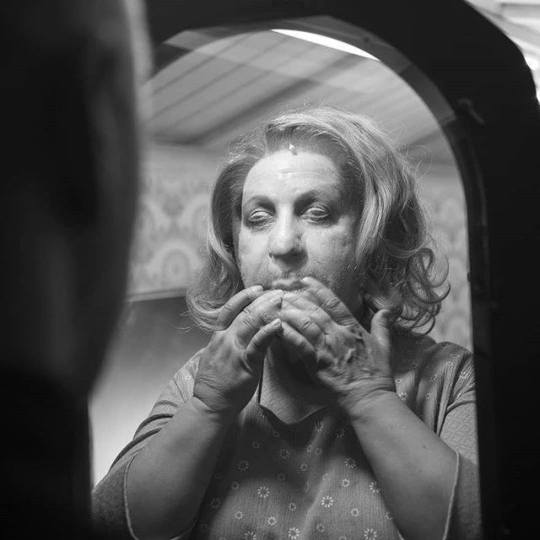

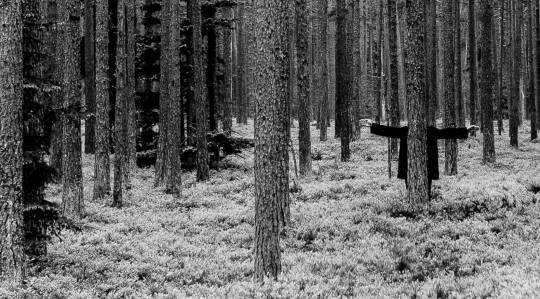

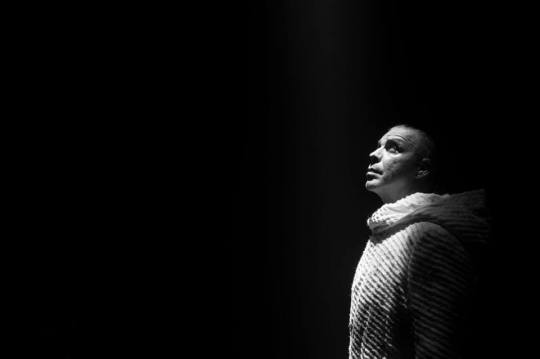

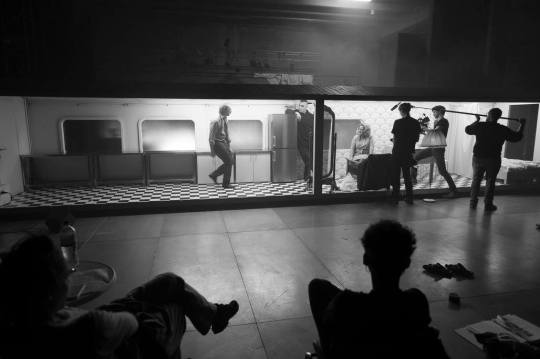


Hänsel und Gretel theater play April - December 2018
EN: In the unique reinterpretation of the Estonian directors Ene-Liis Semper and Tiit Ojasoo and the musicians Peter Tägtgren - Official (Pain), Jakob Juhkam, Clemens Wijers Music Productions and Till Lindemann (Rammstein) the fairy tale definitely remains one: disturbing.
Two children are abandoned by their parents in the forest because there is not enough food left for the whole family. The well-known fairy tale of the Brothers Grimm, which picks up topics such as fear, hope, poverty and abundance, cannibalism or death, is one of the most exciting but also disturbing bedtime stories told to children for several hundred years.
Huge phantom faces, distorted bodies or latex monsters appear on gigantic projection surfaces as complex realities between perversion and poetry, humor and emotion. It is a fairy tale for adults, on the one hand the economic need as a major theme of our time as a starting point, and on the other lures and enchants the audience, only to scare him to death - just like the witch in her sugar house.
Photos: Matthias Matthies / thalia-theater.de
#completely obsessed by h&g till 😍#with his pony tail#just perfect#till is love 🖤#till lindemann#t.lindemann#hansel und gretel#lindemann#lindemann 2018#rammstein
165 notes
·
View notes
Text
Nüüd ma teen tasa kõik need aastad. Nüüd ma matan maha kõik need ööd. Mind kuulutavad vabaks katuseräästad, viimast korda end risti ma löön.
Mu kohtunik on igavene neoon, ja kohtumajaks katuseplekk. Ma kuulutan, taustaks sudu foon, igaveseks võin saada iga hetk.
5 notes
·
View notes
Note
26, 37, 43 and 53? for the ask game?
26. Have you ever won a contest?
I won some national awards for my poetry in highschool .. if that counts? god thats dorky.
37. How would you describe your sense of humour?
god i don't know. dark? not in the bigoted-jokes-are-funny kind of way, more of a. you've got to laugh or you'll cry kind of way. people have expressed surprise when i've laughed before, as if they didn't think i could. do that? so i guess i'm kind of stoic? i think mostly i'm just autistic and clinically depressed.
43. Is there a movie you detest for a very specific reason?
BOY IS THERE EVER. I LOVE TO HATE MOVIES. In The Eye of the Beholder (1999) is one that i viscerally hate because it was so bad that it wasn't even funny, it was just sort of nauseating. Like that is probably my least favorite movie ever just because of how much i felt like I had wasted my life and time after seeing it. Head (1968) also sucks, but in a funnier way. I don't really have any interesting movie opinions though. that's more @mylambandmartyr's ballgame
53. How many languages do you speak?
fluently? one. English. I'm conversational in German and Spanish, and i have functional vocab for Japanese, but i'm out of practice. i have a light familiarity with Yiddish, French, Russian, Mandarin, and Inupiat (<- my people's language, not taught in my area bc my sick freak of a father moved to the midwest.)
I'd like to learn at least the basics of Hebrew, Dakota, Finnish, and maybe Polish, Albanian, and Estonian, but thats a lot of languages. I wish I could dedicate my entire life and time to language learning but I don't really have access to many good resources... and people don't pay you to practice tonality and conjugation, generally speaking .
2 notes
·
View notes
Text

1965
Alver, B. (2017), omajuur
0 notes
Text
Eurovision 2003 - Number 45 - Ruffus - "Eighties Coming Back"
youtube
It's Claire's Birthday! Seriously. Until shortly before EuroLaul 2003 Ruffus were called Claire's Birthday and had released three LPs in the early 2000s. They represent what is definitely a Baltic sensibility when it comes to Eurovision; a distinct soft alt or indie rock sound and attitude.
Eighties Coming Back is pure nostalgia encapsulated in gentle rock form. At this point in time, the 80s were not the flavour of the month. They had not yet come back. That was a least five years away - the thought of that era's return was unfashionable and the lyrics of the songs seem to convey that. The very thought inspires sleepless nights. Remembering the hairstyles conjures nausea and despondency. Yes kids, you're going to grow old. Then someone else's kids are going to rediscover your youth. They'll claim a remixed, subverted, artificial version of it as their own, and then it won't be yours any more. The whole song feels that malaise - the winding down at the end of a generation.
That's a bit too much of an existential crisis to be the norm for a Eurovision song and perhaps Ruffus did not expect to be here. They only won EuroLaul by a single point then could only reach 21st at Eurovision.
After their own identity crisis, the band split later in 2003. Lead singer Vaiko Eplik went solo and has released 16 subsequent albums at a rate of about one a year. He's also written two of the more celebrated EuroLaul and Eesti Laul entries in subsequent years. The rest of the band also stayed in the music industry. Bassist Ivo Etti joined Ewart and the Two Dragons, drummer Margus Tohver joined thrash metal band Palat, Siim Mäesalu went back into academia to study electronic music whilst Jaan Pehk turned to poetry but has been a guitarist in several other Estonian bands.
#Youtube#esc#esc 2003#eurovision#eurovision song contest#riga#riga 2003#national finals#Ruffus#Claire's Birthday#Estonia#EuroLaul 2003
4 notes
·
View notes
Text

The Righteous Estonian Poet
Saved his student
Uku Masing was born in 1909 to a humble peasant family in Lipa, a village in northwestern Estonia. A highly gifted child, Uku had an astonishing facility with languages. He spoke four by the time he finished high school, and by the end of his life was conversant in forty! He attended college at the University of Tartu, the most prestigious university in Estonia, where he studied theology. While a student, Uku began publishing poetry, essays, and translations. He became part of the Arbujad (“Soothsayers”), a group of young poets who were revitalizing Estonian poetry.
After graduating from college, Uku began teaching theology and Semitic languages at the University of Tartu, his alma mater. His brilliance, dynamic teaching style, and offbeat eccentricity made him popular among students and colleagues alike. As a translator, there was nobody like him. He could translate from twenty languages. Uku had a lifelong interest in Jewish religion and culture, and translated directly from Hebrew to Estonian, which nobody else could do. In 1939, Uku was invited to lecture at Hebrew University in Jerusalem, but unfortunately the outbreak of war made it impossible for him to attend.
In 1941, Nazi Germany invaded Estonia. As a well-known Judeophile, Uku came to the attention of the German occupiers as a subversive figure. Under pressure to conform to the new regime in charge of the university, Uku instead quit his job to focus on preserving Jewish religious and cultural artifacts. Thanks to his tireless efforts, many one-of-a-kind items were saved from Nazi looters. As the Nazis began targeting and deporting Estonian Jews, Uku reached out to his old student Isidor Levin to see if the young Jewish folklorist needed help. The offer was a lifeline to Isidor, who was on the list for deportation to a concentration camp like most of Estonia’s other Jews. Uku and Eha brought Isidor into their home. They protected him, kept him safe, and provided for his daily needs, never knowing how long they would have to live like this. The German occupation of Estonia lasted three long years. During this entire time, the Masings did everything they could for Isador, including providing him with fake identity documents in case he should be arrested. Uku and Isidor spent the long hours together discussing folklore, religion, poetry, and philosophy.
Both Uku and Eha were questioned by the Gestapo, and under penalty of death they swore they weren’t helping any Jews. In fact, they saved Isidor Levin’s life. He later became a prominent folklorist and academic who was honored by Estonian president Lennart Meri before dying at age 98. Uku Masing is now regarded as one of the greatest Estonian poets. After the war, he led an investigation of Nazi war crimes in the Klooga concentration camp. In 1969, Israeli Holocaust Memorial Yad Vashem honored Uku Masing as Righteous Among the Nations. Uku Masing died in Tartu, Estonia in 1985.
For saving his friend’s life and caring for him, and for his beautiful poetry, we honor Uku Masing as this week’s Thursday Hero.
41 notes
·
View notes
Text
akrostihhon
praegu:
aeg enne ronge
laulud, mis laulda
austus määramatuse vastu
tee, mis sa teed
isetus
alati:
pai üle pea
riimide üles leidmine
aastarõngad kasvavas puus
elujanu ja selle isud
gravitatsioon
unenäod
1 note
·
View note
